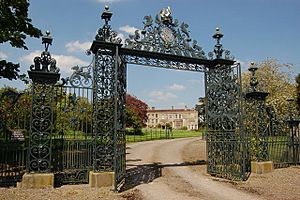Sir John Guise, 3rd Baronet facts for kids
Sir John Guise, 3rd Baronet (born around 1677, died 1732) was an important landowner and politician in Britain. He lived at Elmore Court in Gloucestershire. Sir John was a member of the House of Commons, which is a part of the British Parliament, from 1705 to 1727.
Contents
Early Life and Family
Sir John Guise was the only son of Sir John Guise, 2nd Baronet and Elizabeth Howe. His mother's father was John Grubham Howe, who was also a Member of Parliament (MP).
When Sir John was just 12 years old, in May 1690, he was given the job of Constable of Gloucester Castle. This was an important position.
Becoming a Baronet
Sir John's father passed away on November 19, 1695. After his father's death, Sir John inherited the title of Baronet. This meant he became the 3rd Baronet in his family.
Early Steps in Politics
Even before he became a Baronet, Sir John was interested in politics. In 1695, his father put him forward to become an MP for Cirencester, but he did not win.
After his father died, Sir John tried again to become an MP. He wanted to take his father's place as the MP for Gloucestershire. He spent a lot of money, about £1,000, on this election. However, he was defeated again.
In 1697, Sir John became a Colonel in the White Regiment of the Gloucestershire Militia. This was a local military group.
Marriages and Financial Challenges
Sir John Guise married Elizabeth Napier in June 1696. Her father was Sir Nathaniel Napier, 2nd Baronet, who was also an MP.
Financial Difficulties
His father's family estate was not in good financial shape. Because of this, Sir John had to agree to a very strict marriage agreement with Elizabeth's family. This agreement meant he had to be very careful with money.
Sir John continued to be involved in politics. He sometimes supported his uncle, Jack Howe, who was a Tory. Other times, he sided with the local Whig politicians.
Elizabeth, his first wife, died in 1701. After her death, he tried to become an MP for Gloucestershire again in 1702. He actually received more votes than his uncle. However, the Sheriff (an official in charge of the election) did not count many of his votes. Sir John tried to challenge this decision, but he was unsuccessful.
A Second Marriage for Stability
By 1710, Sir John's health and his estates were not doing well financially. To improve his money situation, he married a wealthy widow named Anne. She was the daughter of Sir Francis Russell, 3rd Baronet, an MP. They married in January 1711. Anne had been married twice before.
This second marriage also came with a strict financial agreement. Sir John was even forced to give up his job as Constable of Gloucester Castle in 1711.
Becoming a Member of Parliament
Sir John Guise was finally elected as a Member of Parliament for Gloucestershire in the 1705 general election. He was re-elected in the 1708 general election. However, he started to feel unhappy with his Whig colleagues. He lost his seat in the 1710 election.
Representing Great Marlow
In 1719, Sir John bought some important lands in Harleyford and Great Marlow from Sir James Etheridge, who was also an MP. This purchase gave him a strong political influence in that area.
Because of this influence, he was elected as an MP for Great Marlow in the 1722 general election. He was defeated in the 1727 election and did not try to enter Parliament again after that.
Later Life
Sir John Guise passed away on November 16, 1732. He had one son from his first marriage, named John. His son inherited the Baronet title after him.
Images for kids
 | Georgia Louise Harris Brown |
 | Julian Abele |
 | Norma Merrick Sklarek |
 | William Sidney Pittman |



